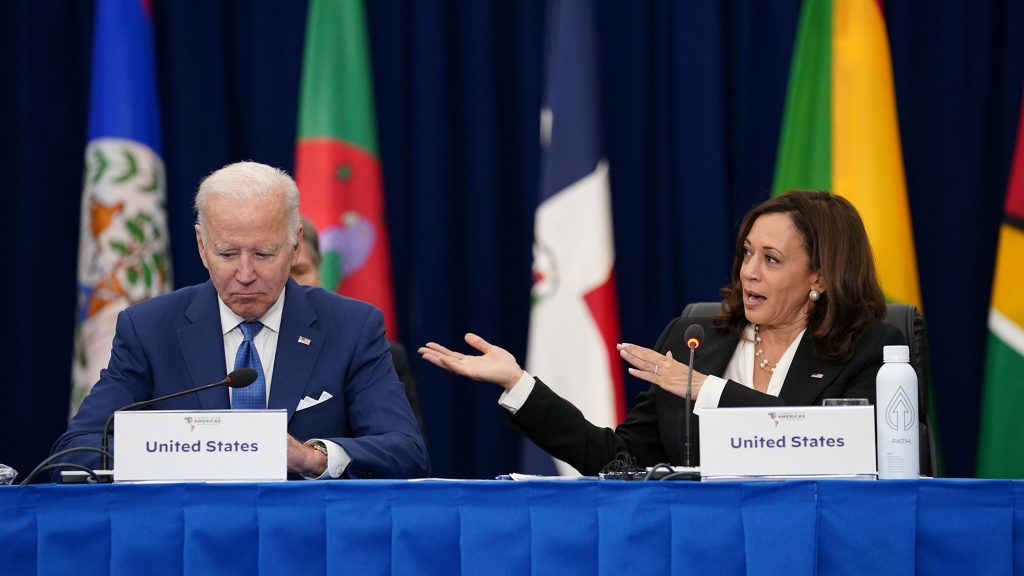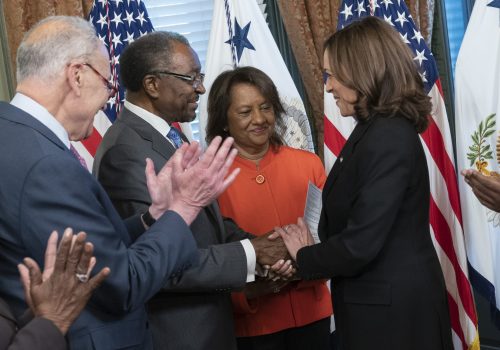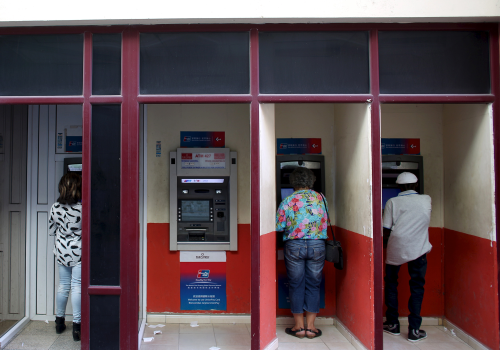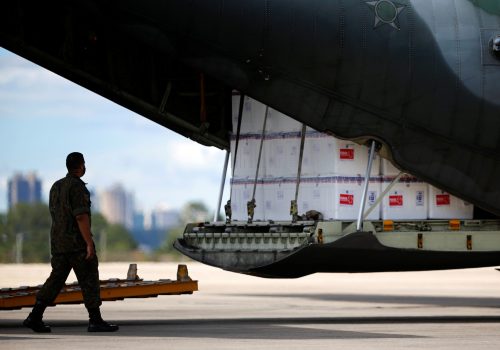The United States has a short window to carve out a new diplomatic and economic era in its relationship with the Caribbean Community (CARICOM).
Last month’s Summit of the Americas in Los Angeles is now in the rearview and drew ample criticism from US partners in the hemisphere. Despite this, CARICOM governments came away relatively pleased with the attention they received and with a clear sign from the United States that the region matters. Going forward, Caribbean eyes will be on the United States’ follow-up moves and whether engagement will be consistent and sustained—or fall aside.
The momentum for a new diplomatic and economic era is already building following the Summit of the Americas and after a meeting of CARICOM in Suriname, where governments discussed issues including food security, energy resilience, and climate change—and reflected on recent engagements with allies like the United States. CARICOM will meet again in the Bahamas in February 2023; by that time, the United States should put in the work to more deeply solidify its relationship with CARICOM and also make inroads on some of the commitments made at the Summit of the Americas.
CARICOM is a strategic partner for the United States. Dispersed across the Caribbean Sea, South America, and Central America, CARICOM members’ priority areas overlap with most US interests. This includes migration, relations with Venezuela and Cuba, transnational crime, and Chinese and Taiwanese engagement in the hemisphere. CARICOM—whose members vote in major international organizations—is also vital to the United States’ multilateral goals.
Recognizing CARICOM’s challenges and importance to US interests, Vice President Kamala Harris announced the US-Caribbean Partnership to Address the Climate Crisis 2030 (PACC2030): a new framework focused on supporting climate and energy resilience in the region. The United States and CARICOM also established three new joint committees on food security, energy, and development finance. And while CARICOM countries have frequently spoken with Harris, US President Joe Biden—by holding his first discussion with CARICOM leaders since taking office—reinforced the unique challenges facing the region and underscored their need for immediate relief.
But the momentum from the Summit of the Americas and the CARICOM meeting has a short shelf life. Skepticism will arise about the United States’ commitments to CARICOM in the months to come, including about the effectiveness of the joint committees and whether PACC2030 will actually help the region overcome its climate and energy-resilience challenges. The summit’s success hinges on whether new commitments can move forward or produce tangible results. If not, the summit and PACC2030 will be seen as another broad US policy or framework lacking resources and teeth. And what was considered a bright spot in Los Angeles would be quickly dimmed if weeks and months go by without action.
This is why immediate moves are critical. The United States should use the time leading up to the next CARICOM meeting in February to strengthen the US-CARICOM relationship.
First, the United States should send a cabinet-level delegation led by Harris to attend February’s meeting. CARICOM meetings often attract senior officials from across the world who believe in the value of holding discussions with the community as a bloc: United Nations Secretary General Antonio Guterres paid a visit to the Suriname meeting. A senior-level visit in February would add continuity to Biden and Harris’ meeting last month at the Summit of the Americas and would save that summit meeting from being written off as an ad-hoc event. With February’s CARICOM meeting seven months after June’s summit, it would also be an opportunity for the United States to assess progress on PACC2030 and the joint committees; participants could also gather insights from policymakers, the private sector, and civil-society leaders in the Caribbean who did not travel to Los Angeles. If this occurs, it would be a profound moment in US-CARICOM relations, especially as the region laments that it is often cast aside to the outskirts of US foreign policy in the Americas. This visit could bring positive visibility to US engagement in the Americas.
Second, the Biden-Harris administration should begin working with Congress to implement aspects of PACC2030 before February. An important measure from PACC2030 calls for exploring ways to increase access to US International Development Finance Corporation (DFC) financing for “underserved” Caribbean countries, including middle- and high-income countries, for climate and clean-energy projects. Most CARICOM countries have limited access to the DFC since the corporation, much like other international financing institutions, prioritizes low-income countries. Except for Haiti, all CARICOM countries are classified as middle- and high-income. As a result, members are unable to access needed concessional financing to build climate and energy resilience—the two focus areas of PACC2030.
However, expanding the scope of DFC requires congressional action. In 2019, Congress made amendments to the BUILD Act that allowed the DFC to work with middle- and high-income European countries that wanted to improve their energy security. Except for a few, Caribbean countries are dependent on fossil-fuel imports for energy needs and that makes them vulnerable to the volatility of global energy markets. Some citizens pay electricity prices that are more than double the average price in the United States. Out of necessity, several countries, such as Antigua and Barbuda and the Bahamas, are turning to Venezuela to offset the high costs of fuel via oil alliance PetroCaribe—raising the stakes for Washington to maintain and increase its presence in the region. Caribbean countries tend to enjoy bipartisan support on Capitol Hill, so it should be within reach for Congress to replicate the success of the DFC carve-out for European energy.
Finally, US state governments have a role in improving the US-CARICOM economic relationship through the Cities Forward Initiative announced at the Summit of the Americas. For example, expanding financial relations between CARICOM countries and local banks in the United States can help address de-risking in the region. De-risking, or the loss of correspondent banking relations, due to the limited profitability of the Caribbean for big US banks isolates the region from global finance. While big US banks have found small Caribbean markets as unprofitable, medium-sized banks might not. The challenge is to build relationships between small- or medium-sized banks and Caribbean financial institutions. Outreach from state governments to the Caribbean can be helpful as local US governments and their institutions can build new relationships between US and Caribbean financial institutions through mechanisms that bring financial actors together such as a US-Caribbean Banking Forum.
In addition, CARICOM offers US states new markets for their imports and exports. Several CARICOM governments—like Jamaica, Guyana, and Trinidad and Tobago—are building or have already established sectors such as call centers, boosting the region’s nearshoring potential. The prevalence of English and the similarity of time zones between Caribbean countries and the eastern United States increase the region’s potential in this sector and can be useful for smaller US companies.
The Cities Forward Initiative can also increase US engagement with the US-based Caribbean diaspora to help inform future US policy toward CARICOM. The Caribbean diaspora hovers close to 4.5 million and is concentrated in Florida and New York, with growing numbers in Texas. Leaders in these states should consider holding community consultations that teach locals about CARICOM markets and consider sending US local-government and private-sector leaders to the region to source new products and services that benefit both CARICOM and US subnational economies. This can also increase flows of people-to-people exchange, potentially improving relationships between institutions such as universities.
With just seven months until the Bahamas meeting, the United States should seize the moment to build goodwill with CARICOM and begin deepening its relationship with the region by connecting US and Caribbean cities and institutions. Talk is cheap but action is worth gold. To make sure that the positive outcomes from June’s summit don’t go to waste, it is time the United States shows how committed it is to its neighbors in CARICOM.
Wazim Mowla is the assistant director of the Caribbean Initiative at the Atlantic Council’s Adrienne Arsht Latin America Center and is a nonresident scholar at Florida International University’s Jack D. Gordon Institute for Public Policy.
Further reading
Fri, Jun 3, 2022
The Summit of the Americas should shift US Caribbean policy into overdrive
New Atlanticist By Jason Marczak, Wazim Mowla
The United States has the opportunity to build new diplomatic, economic, and energy ties with a critical region.
Tue, Mar 1, 2022
Financial de-risking in the Caribbean: The US implications and what needs to be done
Report By Jason Marczak, Wazim Mowla
This report identifies how the withdrawal of correspondent banking relations, otherwise known as de-risking, affects Caribbean economies, people, and US-Caribbean relations.
Wed, Feb 23, 2022
US-China vaccine diplomacy: Lessons from Latin America and the Caribbean
Report By
The implications of diverging COVID-19 responses, notably at the onset of the pandemic’s rise in the region, will reverberate beyond the health sector. What might the differing US and China pandemic approaches portend for future influence in the region?
Image: US President Joe Biden and US Vice President Kamala Harris meet with leaders of Caribbean nations, as a part of the Ninth Summit of the Americas in Los Angeles, California, on June 9, 2022. Photo via REUTERS/Kevin Lamarque.



